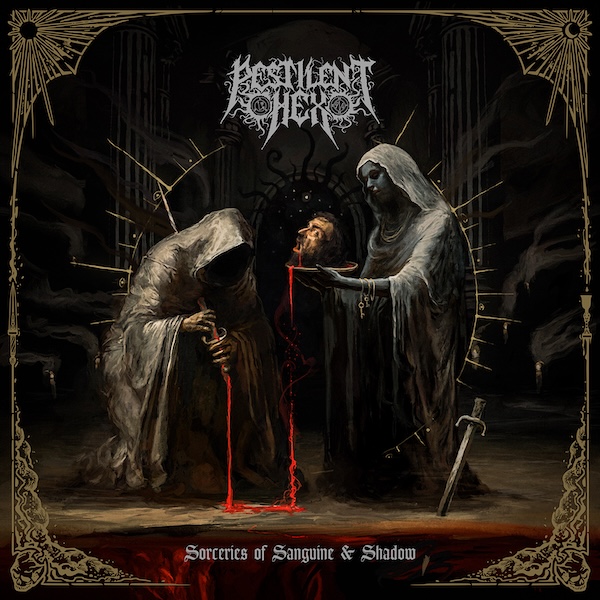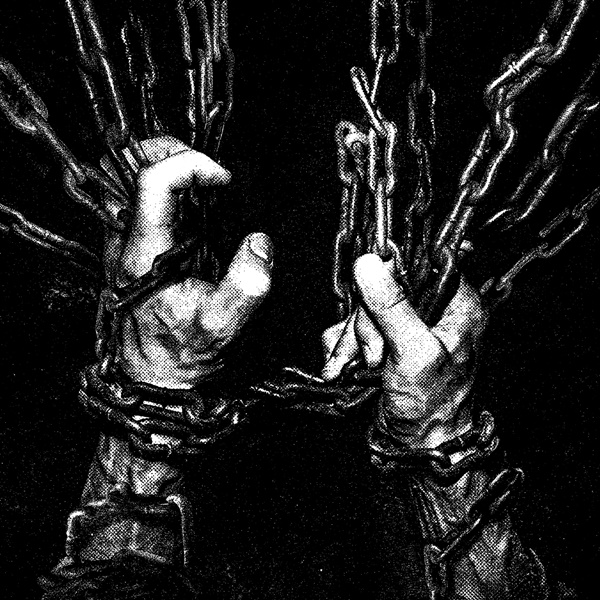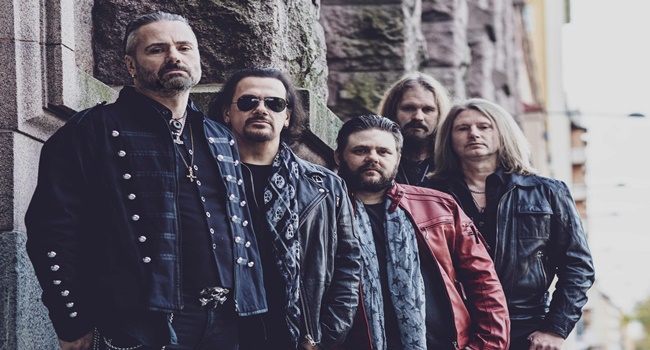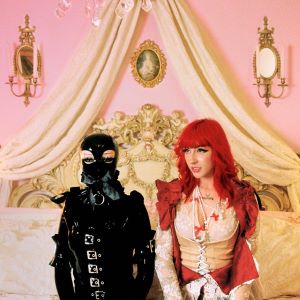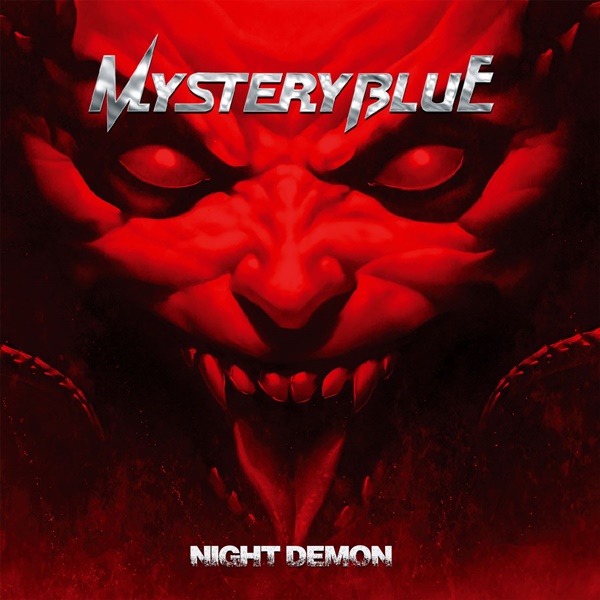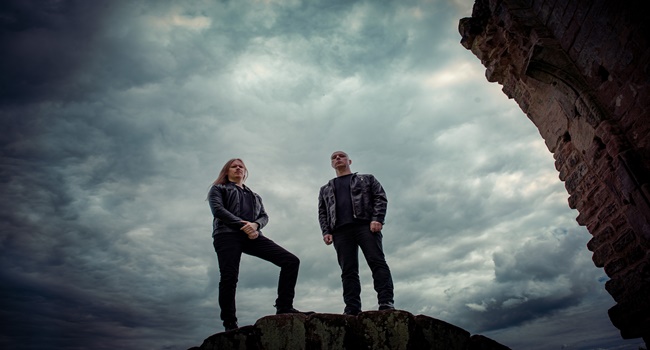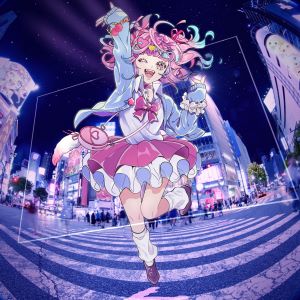Photo: Marshall Kreeb
Sometimes the passage of time allows older bands to resurrect new feelings of what they’ve accomplished in the scene. Take the case of Indiana-based doom metal outfit The Gates of Slumber. Formed in 1998, the band would release numerous demos, EPs and five full lengths before the unfortunate passing of bassist Jason McCash in 2014 saw the band grind to a halt. In 2019 a German metal festival Hell Over Hammaburg would reach out to see if the group would reunite for their 2020 edition. A reunion tour would follow until the COVID pandemic once again halted proceedings – enough to start the songwriting efforts on a new studio record.
The self-titled album finally has been released – another outstanding effort of pure doom metal excellence. Possibly achieving the band’s best sound to date, most will be swept away by the heaviness and foreboding atmosphere present in all the tracks. We reached out to bassist Steve Janiak to catch us up on his arrival in the group, the work behind the record, thoughts on the simpler cover art, memories around his favorite albums and festival experiences, a great Uber-related story he heard during his days as a driver, what success means these days, plus future plans with all of his bands including Apostle of Solitude and Devil to Pay.
Dead Rhetoric: Even though you officially joined The Gates of Slumber in 2019, your activities with the band date back to the mixing / recording of the 2002 Sabbath Witch demo. Do you feel like things have come full circle being in the group now, and how do you feel about the evolution of their discography over the years?
Steve Janiak: That’s a great question. At the time they recorded that demo, I was pretty good friends with the drummer Chris (Gordon), he knew that I had a Roland 24-track or maybe 16-track recorder that I used for my bands at the time. He wanted to record a demo; he talked me into coming out to his buddy’s house to record it because that’s where they practiced. I brought basically whatever microphones I had, recorded it. We did it kind of live, recorded the vocals after it, mixed it, and I had no idea that they were going to have this long, illustrious career. They were friends of mine, another local band, and we have quite the history in Indiana of being band buddies. And then they went on to bigger things and that was pretty amazing.
Their lineup shifted, and the sound would shift slightly with the different lineups too. There’s a lot of moving parts there. I don’t want say they have a Spinal Tap-ish thing, but they’ve had some drastic shifts. I’m very fortunate to be able to play with these guys now. We are all older and life’s not the same through the rose-colored glasses of the younger musicians that we were. Everything is a little more laid back, realistic, how much more fun can we have before we can’t play anymore, if that makes sense. I pinch myself to be able to play with these guys, to play bass which I’ve never really done. My first time playing a bass in front of a crowd was the first day of the tour in 2020.
I can see the long arc though. They were very doom, then they got a little more metal, and then it got more doom, more bleak, and things ended when a lot of tragedy happened. When they decided to pick the band back up, I just happened to be at the right place at the right time to be asked at all. What we’ve done with the new material is some of the best stuff I’ve ever been a part of. People are responding really well to it, and we hope that trend continues. Fans can be fickle, but when a band goes away for as long as they have, there’s a lot of excitement when the first new material comes out. I’m looking forward to seeing what the future holds.
Dead Rhetoric: The Gates of Slumber self-titled album is the latest studio record for the band – and the band’s first recording since the reunion took place back in 2019. Following the festival and touring excursions, how did the songwriting and recording process evolve – as I understand that the pandemic did slow down the writing process a bit?
Janiak: Yeah. I joined them, they had already been playing together for a couple of months, maybe. I know they were trying to relearn the old songs, which they hadn’t played in a long time. In the midst of some of that frustration, they started to spit out some new ideas. Chuck had a new song that turned into “Embrace the Lie”, Karl came up with “Full Moon Fever”, so by the time I showed up with a bass, they already had a couple of new ideas. After a few practices I had nailed down some of the songs they wanted to do for the tour, and then they presented me with the new ideas. We were always doing this together. This is funny to think about now but there was talk in 2019 of taking these songs, going into the studio real fast, and put out an album before we do the reunion tour. Which is hilarious because we didn’t get them done in time, this album took so long that it’s a miracle it happened.
The pandemic definitely didn’t help. During the shutdown we didn’t do a lot of rehearsing. We felt like we couldn’t until it was safe to do so. We worked through it. We had a Patreon where people joined for a few dollars a month, and they would get new songs as they were developed in raw versions. We did some improv doom metal, and some of those songs are still waiting to be plucked from the ether as it were. We have other new songs. We figured we had about 35-36 minutes, and that was going to be good. We knocked them out, we thought the flow was good, and then it was a waiting process for when we could finally get into the studio. That didn’t happen until September of 2023. Once we get in there, it was pretty fast – we recorded it in two or three weekends. Everything was done, and we sat on it, it was mastered. We didn’t know when it was going to come out, there was a split with some of the people at the label of Svart. That was another wrench, they paid for it – so had they decided not to put it out, we would have had to buy it back. They decided they wanted to go with it, and then we put the artwork together.
It’s all good. We’ve had a lot of time to forget that we recorded it. So far, the response has been really good, and we are very happy.
Dead Rhetoric: Where do you see the album sitting in the discography of their output – as you said previously, you are aware of the many style shifts they’ve made with other lineups over the years?
Janiak: That’s really hard to say. They have some epic songs. On some of their earlier recordings, the production is not as crisp or as modern sounding. It’s hard for me to compare the actual albums. The other thing too, if the styles are slightly different, you might be more down for some faster gallops, I don’t know. Sometimes you want to go straight to the bottom of the earth with the doom. I don’t know where it fits. I probably won’t be able to tell you until we have another album out, you know what I mean? It’s some of the best material I’ve been a part of, the vibe is always there, Karl’s solos are on fire, and I love Chuck’s drumming. I have some big shoes to fill on bass, Jason McCash was a monster on his instrument and kind of the driving force of the band. I want to be in the sphere of his creativity and honor that in a way. I try to bring what I can bring, play the bass, and fill those gaps.
Dead Rhetoric: How do you approach the bass in this power trio format compared to your work as a guitarist in Apostle of Solitude and Devil to Pay? Have you always been a musician that enjoys exploring different styles and genres to satisfy your musical tastes and creativity?
Janiak: I would say yes. I like pop, rock, heavy metal, and a little bit of country. I’ve always been in hard rock related bands. As the bass is not my native instrument, I’m always learning. You can write a really good riff on the bass, but it’s going to have a different underflow than the guitar riff. I’m trying to follow along, other times I embellish to make more of a musical line in there. Other times I need to hold back. Because I sing and play, that’s a distinct point of interest for me. Playing the bass and singing is easier than playing the guitar and singing. I’m not really sure why. The guys were okay with me doing some harmonies, and that turned into here’s a song I wrote, the lyrics, this is how it goes, and Karl sang it for a while. The song “We Are Perdition”, I didn’t really want to sing lead on it at first, because I thought I don’t want people to hear Devil to Pay. I’m not trying to step in and be ‘hey – look at me’. The more we went on, the more we tried it. I sing the verses, Karl puts his lead part in on the chorus, we sing harmony with that.
When we did the tour in 2020, there were parts where I could sing (the songs) under Karl and give him a broader base of vocals. It worked well. At some point we may have a live release from that tour, I know I recorded all the shows on 24-track. Maybe someday you’ll hear the old The Gates of Slumber with me on bass singing backup, we’ll see.
Dead Rhetoric: What do you enjoy most about the doom metal style, and the sound you explore with The Gates of Slumber?
Janiak: I enjoy the songcraft the most. Doom metal is an ethereal thing. It’s not easy to really define it. It could be doom metal and plodding, doom metal and sorrowful, doom metal and aggressive. There are a lot of people that use doom to call things doom, and you are in the linguistic nightmare of a genre argument that will probably go on forever on the internet. As far as this album, outside of “Full Moon Fever”, the rest of the songs have a certain menace, there’s a bitterness there. I’m not sure exactly how to articulate it. I feel like we came real close to that vision of despair and anger, if that makes sense.
Dead Rhetoric: What are your thoughts on the cover art this time around?
Janiak: Me personally, I probably would do something different. I didn’t have any ideas, Chuck and Karl both made this determination to do this fully embossed black logo on a black background cover. They had that idea when they started the band, and it never came to fruition. When they got the band back together, I remember saying what are we going to do with the artwork. They said they were going to do the black-on-black theme. When you get the vinyl copy, the logo will be embossed and popped up. It doesn’t translate into the digital version. It’s such a drastic change for The Gates of Slumber that some people are not 100% sure what is going on. They need some creature being vanquished, or a barbarian, and I get it. With the reboot of the band, we are saying we are still here.
Dead Rhetoric: What do you consider three of the best albums personally that continue to inspire you currently – they can be metal-related or otherwise? And what’s your favorite concert / festival memory, witnessing the show as a member of the audience – plus what made that show so special to you?
Janiak: There are so many albums that inspire me. I end up going back to the albums I first listened to in high school when I first got into music and lost my mind. The first Danzig LP, the Masters of Reality album by that band, Louder Than Love – Soundgarden. I could go on for days. Those were all related, heavy guitar stuff. Rick Rubin’s production on the Trouble self-titled effort, that’s another great album and huge influence on me. Even if at the time I didn’t really know what doom metal really meant. I was a late bloomer to Black Sabbath – I didn’t have an older brother with a closet full of records. I didn’t get into too much heavy stuff until the metal appeared on MTV. I was more into ZZ Top, AC/DC, and John Mellencamp when I was a kid. Once I saw my first concert, that was it, I blew all my money on cassettes, going to record stores and stare at the covers for hours.
My favorite memory of going to a festival – I’ve been to a lot of them. My wife and I over the past few years have gone to the Desert Festival events. We went to New York this year, Berlin last year, and London the year before that. We went to Psycho Las Vegas, Planet Desert Rock last year. All the doom fests, Maryland Doom Fest is a great one. Stoner Hands of Doom from way back in the day. I went to that fest in 2002 in Mason, Arizona. That really blew my mind wide open. I met the guys from Unida, I saw Eternal Asylum from Japan at that festival. Liz Buckingham was still in Sourvein at the time, there was so much going on in the underground scene at that time.
Being at all these festivals, I realized the underground was so much more than all the stuff on the radio or the internet. Stonerrock.com was a big resource for me. It changed my life.
Dead Rhetoric: I’ve read in a previous interview that you are an Uber driver to gain flexible income (and I’m sure to spend more time on music). What are some of the strangest things you’ve seen happen, or what’s one incident/ situation that maybe surprised you in the long run?
Janiak: To be clear, I stopped doing the Uber thing because of the pandemic. I couldn’t deal with the idea of people getting in and out of my car when there was a pandemic going on. My experience at Uber driving was okay. Most of the experiences were okay. I would ask all of my passengers what their craziest Uber story was, or what they had heard of. I had a large Rolodex of stories in my brain at the time, that has all slowly faded away outside of the really crazy ones.
I did have a woman tell me a story about a driver she had on the East Coast, what his craziest story was. This guy had picked up a guy at the end of a bar scene closing, three in the morning. He wanted to go to this other bar – they go there, and he needed to go to another bar. He pulls a gun out and forces this guy into the bar to drink with him. The guy orders a round, the bar is still open even though it’s past closing hours. He’s talking and the threat is there – and then he forgets and goes to the bathroom. When he goes to the bathroom the driver runs to the bartender and tells him to call the cops. By the time he comes back out, the cops come, and he’s arrested. I’m glad that never happened to me.
Dead Rhetoric: How do you define success these days? Would you say that definition has changed from your early days as a musician to where you are today?
Janiak: Yeah, definitely it’s changed. When you are young and dumb, you have the whole world in your sight. When you get older you learn what’s really important, friends and family. It’s a little less dire. There’s no great urgency. To be able to still make music and release it even if we are doing it locally or putting it on the internet, we can still reach people and make that connection. There will be people that get it and understand where you are coming from, to get out of it what you are putting into it. That’s more or less my version of success these days. I never had the expectation of massive, crazy success, but I keep the window open. I’m ready for whatever life brings me, the music brings me. I want to play guitar every day and make more progress every day, every week with the material. I’m not going to be around forever, and there’s a lot of stuff I want to get out.
I’m fortunate to be able to play with all the people I play with. Being in three bands is not easy. I don’t think I’d change a thing, really. I hope to be able to contribute as much as I can.
Dead Rhetoric: What would surprise people the most to learn about Steve the person away from your activities as a musician – and in what areas do you think you’ve grown the most personally over the past say three to five years?
Janiak: What people might be most surprised to know is that when I clean the house or do the dishes, I like to listen to oldies. I have a 500-song playlist that I listen to and sing oldies at the top of my lungs. I realized the Misfits put out an album of oldies – and I didn’t realize that until the other night. I listened to them butcher some of my favorites. Nobody wants to hear me sing oldies – just me in my house. If you walked by the house, and heard me singing Neil Sadaka, you might think I’m crazy.
I’ve learned a little more patience. I have more empathy than I did previously. Some of that comes from having cats. When I was younger, I didn’t really have as much of a connection with them as I do now. Life is more precious.
Dead Rhetoric: What’s on the horizon for The Gates of Slumber or any of your other band activities over the next twelve months or so?
Janiak: The Gates, we will do as much promotion for this album as we can. We’ll probably record another video or two. We have an EP of songs already written and ready to record. We will do a split with another unnamed band, and another record down the road. We are in talks to re-release the first two or three The Gates of Slumber albums on vinyl and CD. Apostle of Solitude has a bunch of new songs, and they are almost finished, and ready to record at the beginning of 2025 plus get back to Europe to tour in the fall. Devil to Pay has a new bass player and a new drummer, we debuted those guys in August. We have songs to hammer out, and we are in the jamming process. Maybe next year we’ll be able to get around to getting something recorded. That is keeping my plate full, I wouldn’t be happy if it wasn’t.



